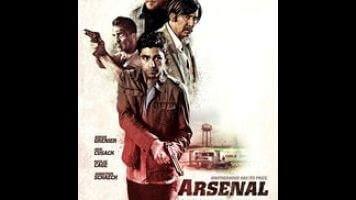Some prime Nic Cage overacting is just a distraction from Arsenal’s faults

For a short while as its story begins to unfold, Arsenal seems like it might represent a tug of war between a gritty indie drama and a shamelessly pointless DTV programmer. It also seems like it might somehow explain what its title means in the context of this movie—it’s not about soccer fans, and while it does feature guns, the characters don’t seem to have access to an arsenal’s worth. But by its bloody end, both of those hopes remain far out of reach.
There are ever-so-slight notes of Southern indie filmmakers like David Gordon Green or Jeff Nichols as Arsenal begins with two young brothers in Biloxi, Mississippi (playing itself—a credit to a movie that might well have outsourced the job to Louisiana). Mikey (Zachary Legendre) is sometimes mean to J.P. (Kelton DuMont), but his big-brother cruelty often gives way to protective instincts—much needed in their economically depressed world that centers on a gloriously neon-lit video arcade. The lovely following shot that introduces the arcade continues to further reveal a back room where local mobsters conduct some dirty business, as if waiting for kids to stumble across them and prove their mettle through silence.
That’s what happens with Mikey, after which the movie somewhat abruptly jumps forward 23 years. J.P. (played as an adult by Adrian Grenier) has made a decent life for himself running a construction company. Mikey (Johnathon Schaech) lurks around the outskirts of the local crime scene, where he comes into contact with Eddie King (Nicolas Cage), the very same mobster whose trust he semi-earned with his silence all those years earlier. Mikey apparently spent a good portion of his offscreen years working for Eddie, who now figures his former protégé owes him. This is how J.P. comes to receive a phone call demanding a large sum of cash for the safety of his fuck-up brother.
As J.P. investigates Mikey’s disappearance with the help of the in-the-know Sal (John Cusack), Arsenal briefly develops an intriguing mystery: Has Mikey been legitimately kidnapped, or has he agreed to go along with an Eddie King scheme to make some quick cash? Somewhere in this movie is a story about brotherly loyalty (though it doesn’t figure out what to say about it) and the costs of youthful decisions (especially when mobsters hang out at your local arcade). But director Steven C. Miller conducts an ongoing distraction campaign against his own movie, with explosions of gnarly gore and Nicolas Cage overacting.
On that tip, it’s hard to stay mad at a movie that puts Cage in a false nose, bushy mustache, and sunglasses to play a guy who spends a lot of time doing coke, gesticulating, and cruelly mocking his perceived enemies when not enraged with jealousy over their fraternal bond. Less delightfully, Cusack also reverts to a familiar DTV mode, dressed up in dark skulking-around outfits and hats, trying to disguise how miscast he usually is as a lowlife. He wears sunglasses, too, as if the movie’s two most recognizable stars each insisted on contract clauses expressly specifying how much time they had to show their actual eyes onscreen.
Arsenal’s star power—not including, to the extent that it counts, Grenier’s vaguely unconvincing attempts at toughness—works as a quick fix for the movie’s weaker elements (like dialogue that actually tells the audience that it’s time to “raise the stakes”), but only momentarily. Anything legitimately affecting about the movie bleeds out, and Cage delivering a blood-soaked monologue or simulating the sound of a burned esophagus isn’t enough on its own to turn Arsenal into the gory, borderline rococo thriller it starts aiming for around the halfway mark. It’s the rare case of a bonkers Cage performance counting as too little, too late.